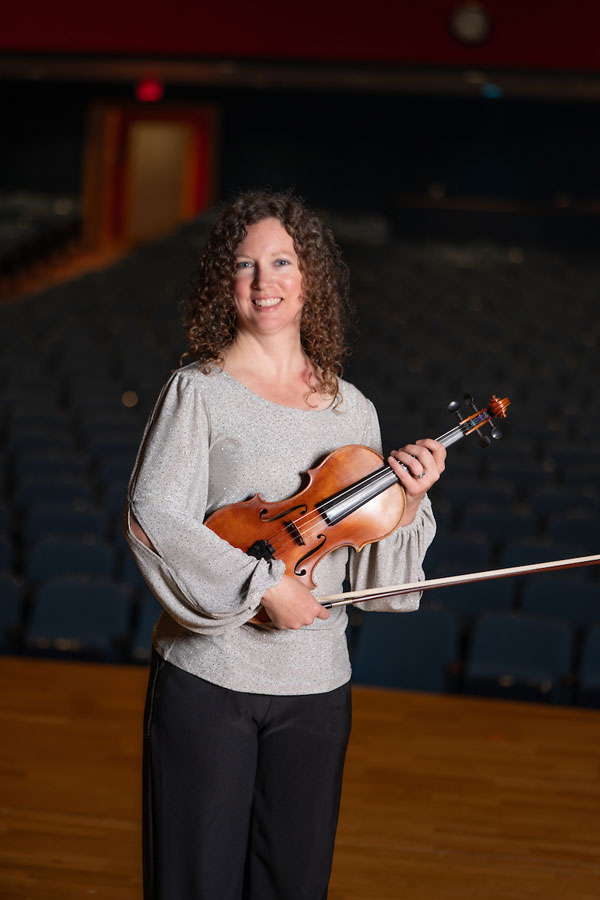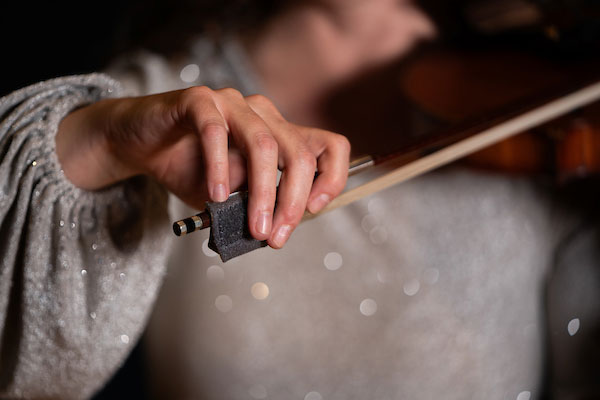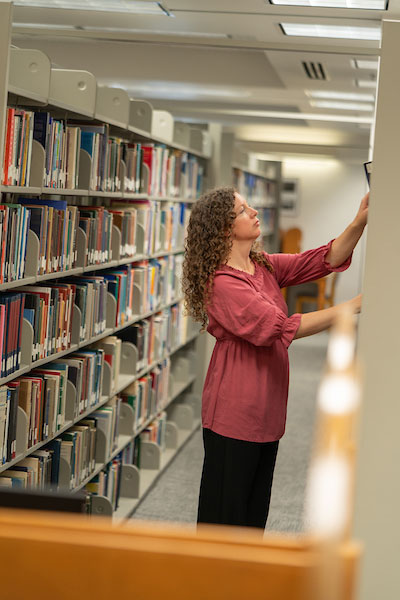On average, more than half of American households – roughly 54% of the homes across the country – include at least one person who plays a musical instrument.
That’s an encouraging, inspiring detail, discovered in a Gallup survey by orchestral instructor Michelle Lynn King, M.A. ’25.

It’s also a figure that takes on a more concerning context, however, when placed alongside some additional statistics King found: Specifically, that 86% of the country’s instrumentalists experience pain and injury as a side effect of their playing, which she said is more than double the percentage of athletes who suffer health-related issues that stem from overuse.
“It’s obvious that if you put your kid in sports, there’s a risk for injury,” King, of Christiansburg, Virginia, recently explained. “But nobody tells you, when you sign up your kid for violin lessons, that there’s a risk of injury with that, too.
“And compounding that factor is the existence of hypermobility, which is not well-known,” she continued, citing what is often referred to as being “double-jointed,” a condition that can contribute to further discomfort among musicians.
King herself first picked up the violin at age 12; she also plays piano and numerous stringed instruments, including guitar. The mother of six children, she and her family came to the New River Valley from Utah in the summer of 2020. The following year, she founded the NRV Homeschool String Orchestra, an ensemble that currently includes about 10 members between the ages of 8 and 18.

In the course of instructing the young musicians, King noticed that several had hypermobility and, as a result, were experiencing added difficulty in playing; when she began to research the matter further, she was surprised by how little information she found.
“Only about 5% of 1,500 sources concerning injuries in musicians even mentioned hypermobility, and only 1% were specifically focused on it,” King has written. “Among those based on scientific studies, researchers were not in agreement on definitions, measurements or important requirements of playing a musical instrument, and most … only found relationships between factors, not causes of injury.”
So, when she approached her graduate studies at Radford, King’s areas of concern formed the focus of her master’s thesis, “Hypermobility Among Musicians.” In the midst of her work, a medical diagnosis she received underscored the seriousness of the plight still further, lending it a more personal dimension.
“I actually found out that I was also hypermobile,” she explained, “and that has given me first-hand insight on the issue and even more motivation to address it.”
To advance her project, King had to learn how to design and execute a research study, a process that involved various tutorials through McConnell Library, as well as a webinar and a first-semester class, “Research Methods in Music,” through which she learned, among other things, how to conduct scoping and systematic reviews of material.

She was also introduced to methods of exploring research questions, narrowing search terms and comparing the use of web search engines and tools like SuperSearch and such databases as MEDLINE and Music Index.
“I obtained nearly 500 sources … through McConnell Library,” King wrote in her thesis. “Most digital articles and eBooks were readily available through the library website. Because of the nature of scoping reviews, some sources were difficult to find, but most were obtained through interlibrary loan.
“Additionally, I visited the library in person to obtain books and magazines unavailable online,” she continued, and “was able to obtain all but 14 sources for my review.”
Hypermobility and overuse injuries merit still more investigation, but King found some possible solutions and preventive methods – such factors as physical conditioning, the use of splints and similar protective gear, individual awareness of habits and techniques and the ways in which performers, through their methods of playing, can avoid unnecessary stress.
On top of the accomplishment of earning her Master of Arts in music last spring, King’s work received further recognition on April 18, when she was named one of this year’s six winners of Radford’s Winesett Awards for Library Research.
The Winesett Awards are presented to students whose library research demonstrates exceptional or innovative use of library resources and whose informational literacy skills show unique development. They’re chosen based on a written essay in which they describe their research processes and use of library resources in their class projects, as well as a statement of support from a course instructor.
Perhaps most importantly, King intends to continue her research and her advocacy and has been connecting with other scholars in the field. She said she’ll use the monetary stipend she earned for the Winesett award to fund her work and related travel and will attend the Performing Arts Medicine Association (PAMA) Symposium from July 10-13.
“I plan to submit my scoping review for publication in an academic journal and continue my work with follow-up research,” King wrote. “I value the academic foundation provided by the McConnell Library and Radford University and look forward to making meaningful contributions in the future.”